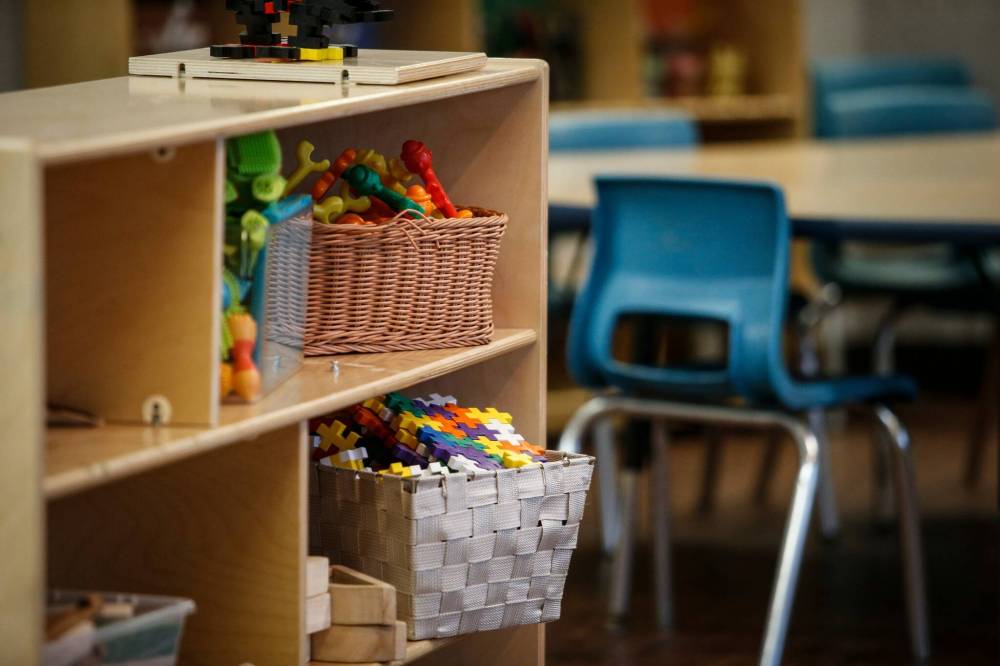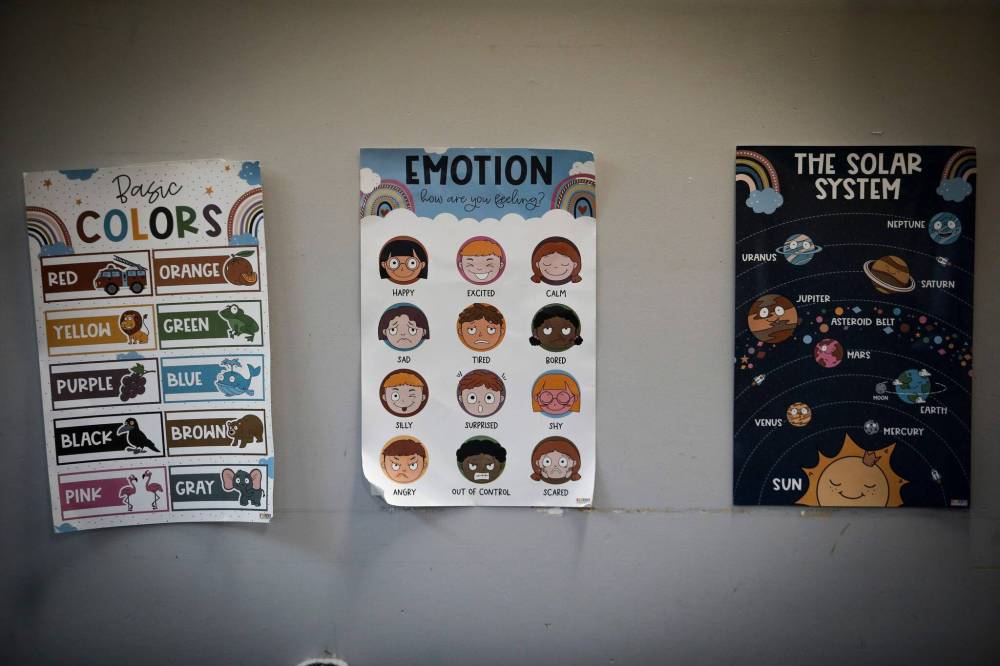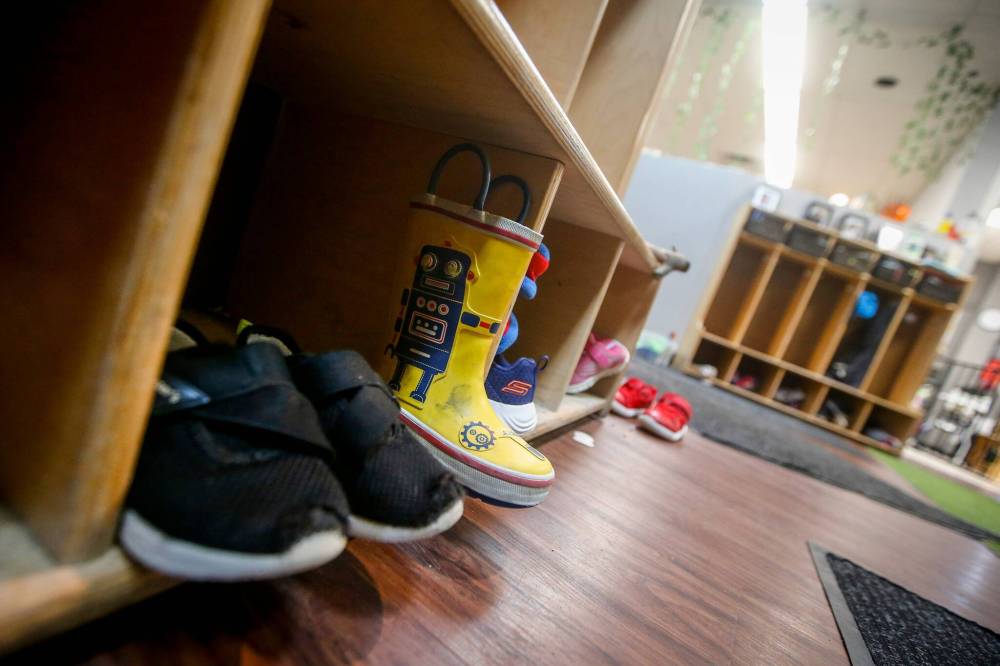When it comes to provincial support for Manitoba children with special needs, there was a moment this summer when Susana Lam thought things were finally improving.
Lam, the director at Seven Oaks Child Day Care Centre in Winnipeg — one of the most inclusive child-care centres in Manitoba — spoke to the Free Press earlier this year as part of its investigation into the state of child care in the province.
She’d been facing hurdles for years with the province’s Inclusion Support Program (ISP).
“It’s just been a lot of fighting, and I mean fighting as in literally arguing… on the phone. Arguing and arguing; there are loud voices, tears, everything, because I don’t think it’s fair that these families and children have to fight so hard to get a spot,” Lam told the Free Press at the time.

RUTH BONNEVILLE / FREE PRESS FILES
“I don’t think it’s fair that these families and children have to fight so hard to get a spot,” said Susana Lam, executive director at Seven Oaks Child Daycare Centre.
Shortly after the child-care series was published in June — and included a story documenting the ISP’s failures — Lam said things started to look up.
In fact, it wasn’t long after she went public that she received funding almost immediately after applying on behalf of a child who didn’t even have an official medical diagnosis — something that hadn’t happened in years.
What’s more, Lam was hearing other directors were also securing ISP funding, meaning more kids and families were being supported. It’s exactly what she’d hoped for.
“I thought after the series came out that they were turning a page here,” Lam said in a recent followup interview with the Free Press.
“Then comes this fall — I’m enrolling a child with some pretty high medical needs — and it’s back to square one again.
“It’s back to me having to say, ‘I’m not doing this,’ and that means I’m not enrolling a child, and for the province to be prepared for the consequences, because I don’t know what families are going to do now.
“They went from approving funding right away shortly after the series to — poof! — right back to the beginning.”
The province’s Early Learning and Child Care (ELCC) website says the Inclusion Support Program is meant to “reduce or eliminate barriers to allow a child with additional support needs to fully participate in an early learning and child-care program.”
It adds: “all children should have equal opportunity to access licensed child care in their community.”
The ISP is fully funded by the province and administered through ELCC, which determines how many hours will be funded for the required extra child-care staff, depending on a child’s specific needs.
Many child-care directors told the Free Press it’s a program worth celebrating, so long as it’s properly executed and available to all children.
But that’s not the case.

JOHN WOODS / FREE PRESS FILES
The Inclusion Support Program is fully funded by the province and administered through Early Learning and Child Care (ELCC) programming. ELCC determines how many hours will be funded for required extra staff, depending on a child’s specific needs.
ELCC’s 2023-24 annual report found that only 51 per cent of licensed child-care centres and six per cent of licensed home-care facilities are taking part in the ISP.
The number has hovered around 50 per cent in recent years — a notable drop from 2016-17, when 64 per cent of child-care centres were taking part in the program.
The province mandates all licensed child-care centres have an inclusion policy, including home-based ones, but there’s no enforcement to ensure they’re accepting children who need additional supports.
The number of ISP-supported children has dropped by more than 300 since 2016-17, despite thousands more spaces being created.
The ISP supported 1,604 children in 2016-17, but only 1,262 in 2023-24.
Meanwhile, the number of child-care spaces in the province has jumped significantly — to 39,050 in 2023-24 versus 31,210 in 2016-17.
Today, only three per cent of those spots are dedicated to children in the ISP, down from five per cent in 2016-17, though there were 20 more ISP spaces this year than last.
“The provincial annual reports are a clear indicator of progress or regression in government funding, programs and policies. That’s trending the wrong way if we’re trying to grow the system,” said Jodie Kehl, executive director of the Manitoba Child Care Association (MCCA).
“The question to ask is, why are not 100 per cent of all regulated facilities participating in the program? What are the barriers?
“This needs to be investigated by the province, so that all children, in all parts of Manitoba, have access to high-quality early learning and child care.”
The MCCA has nearly 4,000 members and offers support to about half of the child-care centres in the province.
It surveyed its members in October to get a better idea of the current state of the ISP. They asked a variety of questions about personal experiences with the program, what is working and what needs improvement.
Nearly 200 child-care centres responded, with 28 per cent of those saying they’ve denied families care due to a lack of ISP funding.
Among the respondents who’ve had to turn away families, a third said there was at least one child in the last two years, with 14 per cent — eight respondents — saying they’ve denied more than five children over the same time frame.

JOHN WOODS / FREE PRESS FILES
Nearly a third of 200 child-care centres responding to a Manitoba Child Care Association survey in October said they had denied families care due to a lack of ISP funding.
Meanwhile, 63 per cent said they require inclusion support but don’t have access to the program. On the plus side, a majority of respondents agreed the ISP is a vital service — even a human right — despite it being plagued by serious problems.
They also applauded the creation of ISP co-ordinators, which has improved communication between child-care facilities and the government. The province has 13 diversity and inclusion co-ordinators, two supervisors and one manager.
Most child-care directors, though, expressed deep frustrations about trying to obtain and sustain funding, as well as find qualified staff.
Lam said her centre used to have about 12 kids supported by ISP, but that number has been halved in recent years due to the hurdles now in place.
When asked whether her centre would consider ceasing its participation in the ISP, Lam said, “We’re not there yet, but it is on the table. I talk about it with my board all the time … It’s so difficult to make it all work.”
According to the ISP, children hoping to receive additional care fall into two categories: a child with a diagnosed life-long or permanent disability and/or who is eligible for Children’s DisABILITY Services; or a child who exhibits behavioural or emotional difficulties characterized by impaired adaptive functioning, which disrupts the child’s ability to adequately participate in activities, with these behaviours continuing over a period of time.
In simpler terms, one path is for children who have already been diagnosed, the other is for a child with behavioural concerns who has not yet been diagnosed.
Tracy Cosser is the executive director of Can You Imagine Inc. — which has five locations in the city — with more than 30 years’ experience in child care.
She said it’s almost a forgone conclusion that children who don’t have a medical diagnosis will be denied care, sometimes forcing directors to get creative with the application process.
Because funding is tied to a child and not a space, that can sometimes mean leveraging a child who has a medical diagnosis but might not need additional support to help secure funding for another child who is displaying issues but hasn’t yet been diagnosed.
Cosser knows the number of kids requiring help is increasing because she sees it every day and hears it from colleagues across the city.

JOHN WOODS / FREE PRESS FILES
Several child-care directors told the Free Press that the number of children exhibiting extreme behavioural issues has climbed steadily over the years, made worse by the COVID-19 pandemic.
Several child-care directors told the Free Press that the number of children exhibiting extreme behavioural issues has climbed steadily over the years, made worse by the COVID-19 pandemic.
The same can be said for children with undiagnosed medical issues, who can face long wait times to get an official diagnosis, such as autism.
But directors are mostly hesitant to try and work the system, even to benefit vulnerable children and desperate families, for fear it could ruin their chances for future funding.
Cosser wants to work with the government, but says it should be just as motivated to support these children as her centres are to bring them into their programs.
“That’s the frustrating part of it all is someone like me, who has been here for 23 years, have I not proven myself to you?” Cosser asks rhetorically, while wiping away tears.
“It just frustrates me to no end when we work our asses off every day for these kids and these families, and the government puts roadblock after roadblock in our way.
“How much more are we supposed to do?”
“It just frustrates me to no end when we work our asses off every day for these kids and these families, and the government puts roadblock after roadblock in our way.”–Tracy Cosser
To get the best chance of securing ISP funding, a child with behavioural issues must be in the program for weeks, if not months, without any additional staffing help. That puts more stress on existing child-care staff, many of whom already feel underpaid and underappreciated.
Even when funding is approved, it’s often for hours less than requested, forcing centres to submit more paperwork to prove that more support is needed.
“The government is the one that mandated that we have inclusion policies. They made us write these policies. They made us put them in place. They said to us, you have to include children with additional support needs, and then we do it and they try to stop us from doing it properly,” Cosser said.
“The government is the one that mandated that we have inclusion policies… They said to us, you have to include children with additional support needs, and then we do it and they try to stop us from doing it properly.”–Tracy Cosser
“That’s the problem. Sure, I can let all of them through my door, but like, I just finished writing (documentation) for this one little girl; she gets care from us when she’s having a meltdown, but she’s a child who doesn’t even know how to engage and play with other children, but we don’t have time to support her to learn that, because at that moment, we might be dealing with this child over here who’s chucking a chair across the room, or this child over here that’s doing whatever, and that’s not serving this child well. We’re not doing her justice.”
Even when a child has a medical diagnosis, a significant amount of supporting documentation is required on an ongoing basis — everything from clinical and health-care reports to safety issues to estimating the anticipated length of a child’s naptime. Naptime, directors said, is often used by the government to justify reducing support by one or two hours.
The situation is so dire that some centres are demanding that parents provide a letter saying there is nothing wrong with their child, or they will only start a child on a three-week trial basis, several directors told the Free Press.
“Half of the families with kids I have enrolled in the ISP, once they get in, they just thank you so much,” Lam said.
“They tell you about how they’ve been turned down by three or four centres already because no one was even willing to try. I just feel for these parents.
“How can anyone not feel for these families? And there’s many, many more out there.”
Even after funding is secured, there’s a financial burden.
ELCC only provides funding to cover the lowest rung of the wage grid — $17.64 an hour — which is what’s paid to a child-care assistant (CCA), the profession’s introductory position. CCAs are only required to take a 40-hour course, and don’t have to have previous experience working with children with special needs.
In order to attract qualified staff, the actual wage is routinely higher, meaning centres that prioritize inclusive programming must find additional money on their own. Even centres that pay their ISP educators a modest $20 an hour have to grapple with deficits in their annual budgets.
According to the MCCA survey, centres spend between a few thousand dollars and upwards of $100,000 a year in added costs. Some fundraise to make up the difference, while others make cuts elsewhere.
“I’m assuming the issue is because there’s just not enough money being put aside for ISP funding, and more and more children every year are being diagnosed, and I feel like that funding amount has remained the same every single year,” Lam said.
“That’s my impression from the grapevine as I’m talking to people. It is great that they’re using a lot of the funds to open new sites, even though there’s a lack of educators out there, but I feel like a lot of that money needs to go to fix things (that are) happening in our system right now.”
Lam added: “I guess my question out there is, why don’t they think of that?”

JOHN WOODS / FREE PRESS FILES
The province has created a specialized ISP team — which includes professionals with backgrounds in disability, child development, child care and clinical social work — plus a new delivery and funding model to streamline the application process, a spokesperson said.
When contacted by the Free Press in June, a provincial spokesperson said the ISP budget had increased by 52 per cent to $20.6 million since the 2021 signing of the Canada-Manitoba, Canada-Wide Early Learning and Child Care Agreement, which included federal government funding of $1.2 billion.
No detailed breakdown of the increased budget was provided.
Additionally, the province created a specialized ISP team — which included professionals with backgrounds in disability, child development, child care and clinical social work — plus a new delivery and funding model to streamline the application process, the spokesperson said.
In a July interview, Education and Early Childhood Learning Minister Nello Altomare acknowledged his department was falling short in terms of the ISP’s funding model.
“We have to get better at this because we have to provide the support that families need when it comes to inclusion support services for kids”–Nello Altomare
“I’ve said that to my cabinet colleagues — we have to get better at this because we have to provide the support that families need when it comes to inclusion support services for kids,” Altomare said.
“We’re not oblivious to this. I’m not satisfied with where we’re at. We need to get better at providing the services that are needed. It’s something, really, I’m quite passionate about and want to see get done.”
Altomare said he prefers block funding over the current case-by-case application process.
“So that you’re not retraumatizing parents,” he said. “So that you’re not continually justifying why your kids need support.”
But little has changed in the months since that interview, according to child-care directors and the MCCA.
The Free Press asked several questions, including what changes, if any, have been made to the ISP that aren’t reflected in the 2023-24 annual report, and how much of the ISP is supported by provincial versus federal dollars.
The department was also asked about a return to blocked funding; whether the 20 additional spaces this year were part of a targeted goal; and if greater capacity will be reflected in the next annual report.
The provincial response mirrored the one provided to the Free Press earlier in the year.
“Manitoba has created a dedicated Diversity and Inclusion team and has launched a new case management model in fall 2023 to better meet the needs of families, children and child-care facilities across the province,” an unnamed provincial spokesperson wrote.
“This team includes 13 diversity and inclusion co-ordinators, two supervisors and one director. ISP co-ordinators have strengthened application efficiency, while offering support and guidance to ensure children and childcare centres have the supports that they need.”
jeff.hamilton@freepress.mb.ca

Jeff Hamilton
Multimedia producer
Jeff Hamilton is a sports and investigative reporter. Jeff joined the Free Press newsroom in April 2015, and has been covering the local sports scene since graduating from Carleton University’s journalism program in 2012. Read more about Jeff.
Every piece of reporting Jeff produces is reviewed by an editing team before it is posted online or published in print — part of the Free Press‘s tradition, since 1872, of producing reliable independent journalism. Read more about Free Press’s history and mandate, and learn how our newsroom operates.
Our newsroom depends on a growing audience of readers to power our journalism. If you are not a paid reader, please consider becoming a subscriber.
Our newsroom depends on its audience of readers to power our journalism. Thank you for your support.